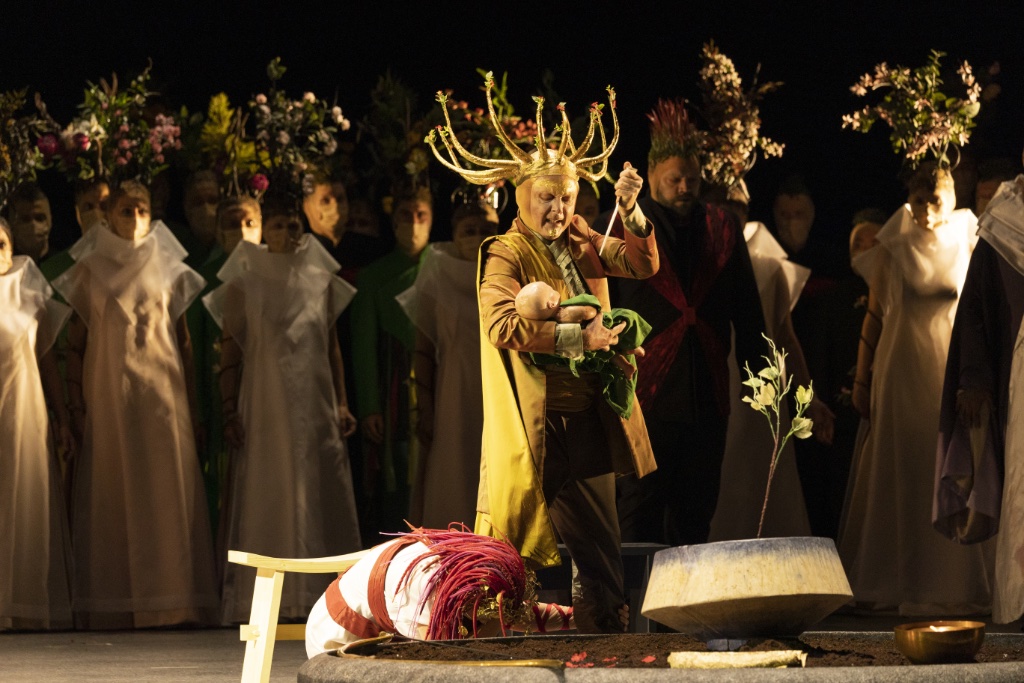
It is always exhilarating to herald the beginning of the operatic season with a new production of a rarely performed work, but when it is the first to be performed at the Opéra National de Paris after a two-year shut-down of theaters and opera houses, the excitement levels are off the scales.
The choice to return with Œdipe, by Romanian composer George Enescu (1881-1955), makes perfect sense since the work received its world premiere in Paris in 1936. The lack of regular performances since then is made all too clear when one notes that its first German production came only in 1996 and the first American staging in 2005.
Enescu and his librettist Edmond Fleg based the work on the Theban plays by Sophocles, especially Oedipus Rex, but they departed most tellingly from the Greek originals by covering the whole of Oedipus’s life in their opera, whereas Oedipus Rex, described by Aristotle as the perfect example of a tragedy, takes place within a single day.
The appointment of Lebanese playwright and director Wajdi Mouawad to make his directorial debut at the Bastille Opera House with Œdipe is inspired; he staged all seven extant plays by Sophocles in 2015, and many of his own plays are influenced by ancient theater (I would especially recommend Les Larmes d’Œdipe and Une Chienne). Mouawad is not afraid to display the messiness (both literal and metaphorical) of myths in his plays.
I was not surprised, therefore, to see maternal water-breaking and much play with the placenta and umbilical cord after Oedipus’s birth, depicted in all its gory glory. For the remainder of the opera, however, give or take the occasional slit throat, Mouawad tends not to overindulge his taste for gore. Even such a notoriously violent moment as Oedipus gouging out his own eyes is staged with admirable restraint.
One of Mouawad’s key directorial decisions is to place at the forefront of this production the crime that, in some versions of the myth, led the gods to punish the family of Laius, Oedipus’s father, and the town of Thebes: Laius’s rape of Chrysippus, the young son of Pelops. The event does not feature prominently in the libretto, but Mouawad provides a spoken prologue to highlight its significance. Although it is characteristic of Mouawad’s beautiful poetic writing style, it acts as an unnecessarily cumbersome counterbalance to the music that follows.
Musically, Enescu, and the orchestra of the Opéra National de Paris, are on thrilling form here. Even if the Romanian composer is said to have been inspired by Igor Stravinsky’s version of the same myth, first performed in Paris in 1927, and by the music of his teacher Gabriel Fauré and of Claude Debussy, the musical idiom and rich orchestration are entirely Enescu’s own. The occasional longueur in the sprawling action of the opera is more than made up for by the beauty and variety of the score.
Conductor Ingo Metzmacher reunites here with British baritone Christopher Maltman as Oedipus. Both performed in a different production of the opera at the 2019 Salzburg Festival, and their experience together pays off richly. Maltman is a renowned lieder singer, and his mellifluous tone and attention to textual detail result in a compelling and idiomatic rendition of Œdipe. The opening-night audience applauded him with enthusiasm.
Although there are several female roles, most notably Œdipe’s mother/wife Jocaste (ably sung by Ekaterina Gubanova (who had starred the night before at Gustavo Dudamel’s inaugural concert), none of them have the prominence of the title character.
The casting is stellar. The small part of Mérope, Œdipe’s adoptive mother, for example, is sung by one of my favorite singers of all time, Anne Sofie von Otter, and it was a treat to hear her live again. Of the other performers, mention should be made of Clémentine Margaine’s Sphinx, Anne-Sophie Neher as Antigone (Œdipe’s daughter by Jocaste), and Clive Bayley as the blind Theban seer Tirésias.
The huge cast included a large chorus, which struggled bravely while singing with masks, and a number of non-singing actors. One note for the casting director: was it necessary to cast the only black actor as a slave whose throat is cut as part of a sacrifice? In ancient Greece, slaves came from a range of ethnic backgrounds, and 2021 may be as good a time as any to stop perpetuating racial stereotypes.
While the costumes by Emmanuelle Thomas, dominated by ornate headpieces on almost all the characters, are spectacular to look at, they remain somewhat perplexing to decode. Much more effective were the imaginatively projected French surtitles, transcribed onto big pillars of marble or slabs of slate, as if we were witnessing the myths being carved into the stone at the moment that they were taking place.
Nick Hammond’s latest book, The Powers of Sound and Song in Early Modern Paris, is now available in paperback and as an e-book here and from online vendors.
Favorite